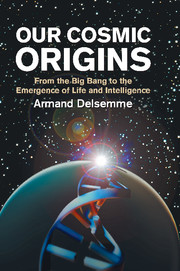Book contents
- Frontmatter
- Contents
- Foreword
- Preface
- Acknowledgments
- 1 Locating humans in the Universe
- 2 The race toward complexity
- 3 The stellar alchemy of metals
- 4 The formation of the planets
- 5 The emergence of life
- 6 The history of life
- 7 The awakening of intelligence
- 8 The other worlds
- 9 Perspectives
- APPENDIX A The standard model of the physics of elementary particles
- APPENDIX B Symmetry in physics
- APPENDIX C The strange role of time in relativity
- APPENDIX D The measurement of long time spans and the age of the Universe
- APPENDIX E The standard model of the Big Bang
- APPENDIX F The cause of the Big Bang and inflation
- APPENDIX G Chirality
- Glossary
- Bibliography
- Figure index
- Table index
- Name index
- Subject index
7 - The awakening of intelligence
Published online by Cambridge University Press: 05 August 2012
- Frontmatter
- Contents
- Foreword
- Preface
- Acknowledgments
- 1 Locating humans in the Universe
- 2 The race toward complexity
- 3 The stellar alchemy of metals
- 4 The formation of the planets
- 5 The emergence of life
- 6 The history of life
- 7 The awakening of intelligence
- 8 The other worlds
- 9 Perspectives
- APPENDIX A The standard model of the physics of elementary particles
- APPENDIX B Symmetry in physics
- APPENDIX C The strange role of time in relativity
- APPENDIX D The measurement of long time spans and the age of the Universe
- APPENDIX E The standard model of the Big Bang
- APPENDIX F The cause of the Big Bang and inflation
- APPENDIX G Chirality
- Glossary
- Bibliography
- Figure index
- Table index
- Name index
- Subject index
Summary
Instinct, intelligence and wisdom are inseparable; they are integrated, react and are blended in hybrid factors.
Alfred North Whitehead, Adventures of Ideas, 1943The fabric of this world is woven of necessity and chance; Man's reason takes up its position between them and knows how to control them, treating necessity as the basis of its existence, contriving to steer and direct chance to its own ends.
J. W. Goethe, Wilhelm Meister's Apprenticeship, 1796The nervous system
Living organisms learned very early on that the detection of changes happening in their environment was essential if they were to survive. Some photosynthetic algae had already learned how to move by wagging their flagellum, in order to look for places where lighting was optimal. The first multicellular organisms increased their chances of survival by detecting changes in their own body, and thus coordinate the response from their different cells.
Contact between one cell and its neighbors developed in the plants by means of enzyme exchange; that is, in a purely chemical way. It is a very slow process which leads to tropisms (such as the flower that turns toward the Sun, or the foliage that seeks light). But tropisms are too slow for animals; quick reactions for attack or defense are essential. A faster communication system appeared: some cells specialized in sending swift electrical impulses from one cell to another, as if along an electric wire. The nervous system began to emerge.
- Type
- Chapter
- Information
- Our Cosmic OriginsFrom the Big Bang to the Emergence of Life and Intelligence, pp. 195 - 208Publisher: Cambridge University PressPrint publication year: 1998



